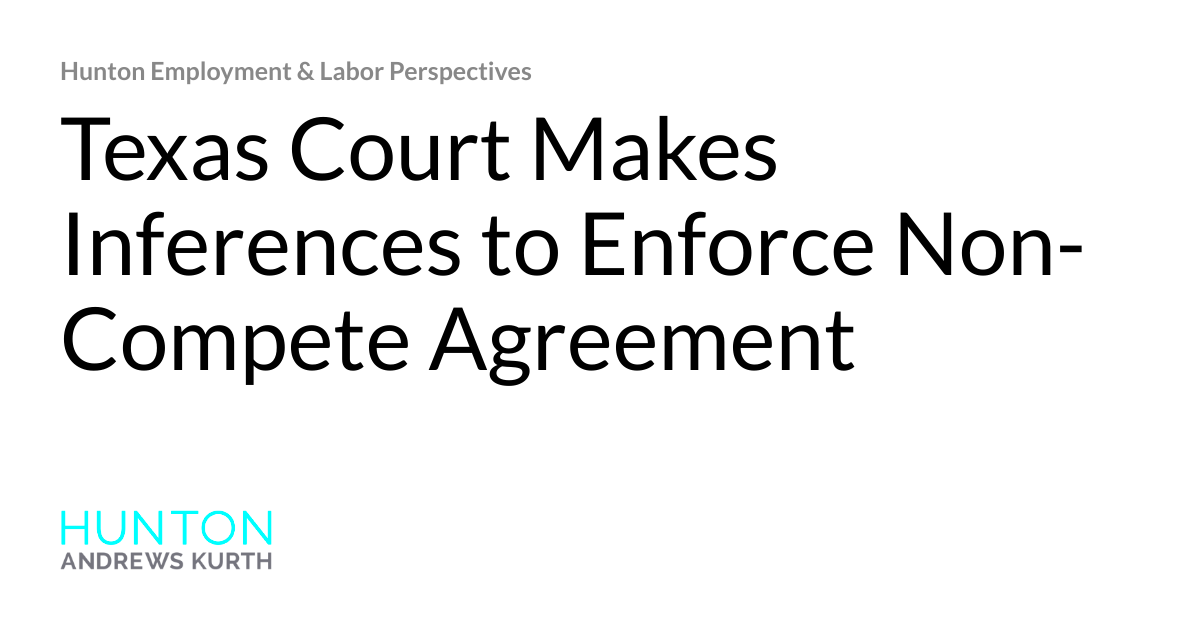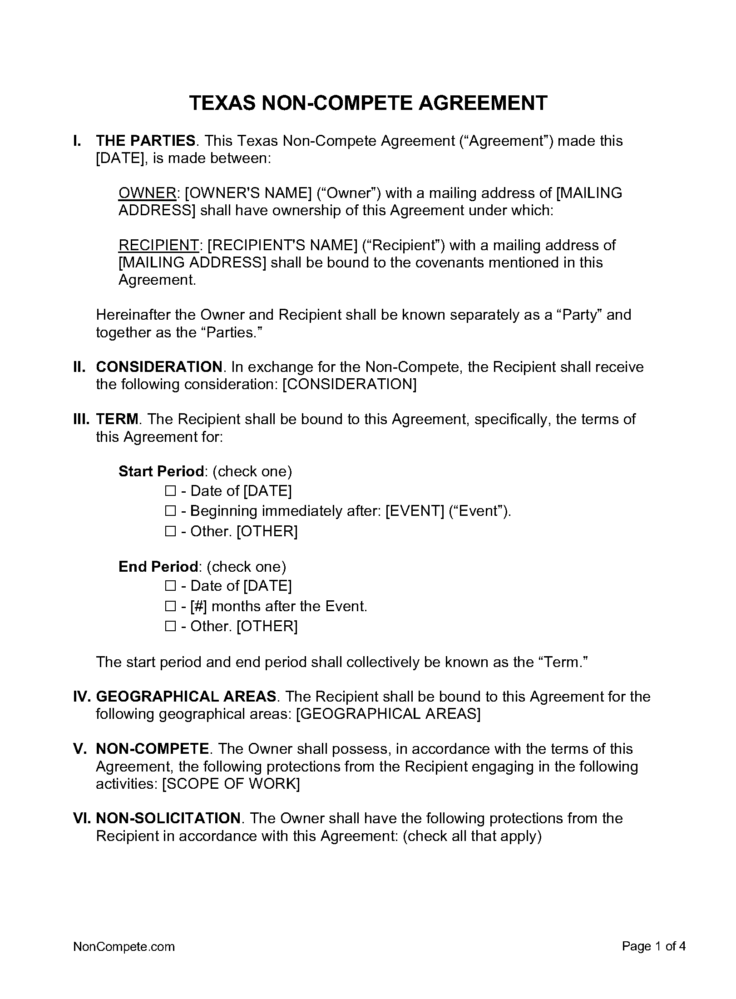What Texas Law Says About Non-Compete Agreements
Non-compete agreements are contracts that restrict an employee from working for competitors or starting a competing business for a certain period after leaving a job. In Texas, these agreements are commonly used to protect businesses from losing valuable employees and sensitive information. However, they must meet specific legal criteria to be enforceable. It’s important for both employers and employees to understand the implications of these agreements.
Key Elements of a Non-Compete Agreement

A well-drafted non-compete agreement should include several key elements to be enforceable in Texas:
- Reasonable Scope: The agreement should clearly define the geographical area where the restrictions apply. A broader scope may lead to unenforceability.
- Time Limit: The duration of the non-compete should be reasonable, typically no longer than two years.
- Consideration: There must be something of value exchanged for the agreement to be valid. This could be a job offer, training, or access to confidential information.
- Protectable Interests: The agreement should protect legitimate business interests, such as trade secrets or customer relationships.
When these elements are present, a non-compete agreement is more likely to be upheld in court.
Enforceability of Non-Compete Agreements
The enforceability of non-compete agreements in Texas hinges on several factors. Texas courts will evaluate whether the agreement is:
- Reasonable in duration: Courts typically favor agreements that last no longer than two years.
- Geographically limited: A reasonable geographic scope must be defined, usually related to where the employee worked.
- Protective of legitimate business interests: The agreement should aim to protect legitimate interests, not just limit competition.
It’s essential to remember that even if an agreement seems valid, courts may still consider it on a case-by-case basis. This means that an agreement that works for one company may not work for another. Understanding these factors can help both employees and employers navigate the complexities of non-compete agreements.
Texas Statutory Requirements for Non-Compete Agreements
In Texas, non-compete agreements must comply with specific statutory requirements to be considered enforceable. These requirements ensure that the agreements protect legitimate business interests without being overly restrictive on employees’ rights to work. Understanding these requirements is crucial for both employers drafting agreements and employees signing them.
According to Texas Business and Commerce Code Section 15.50, a non-compete agreement must meet the following criteria:
- Written Agreement: The non-compete must be in writing and signed by both parties.
- Reasonable Limitations: The agreement must include reasonable limitations on time, geography, and scope of activity. A common standard is that the restrictions should not exceed two years.
- Protectable Interest: The agreement must protect a legitimate business interest, such as trade secrets, customer goodwill, or proprietary information.
- Consideration: There should be adequate consideration for the agreement. This could be an initial job offer, promotion, or access to specialized training.
By adhering to these statutory requirements, employers can better ensure their non-compete agreements are enforceable, while employees can feel more secure knowing their rights are protected.
Restrictions Imposed by Non-Compete Agreements
Non-compete agreements can impose various restrictions on employees, which can significantly impact their future job prospects. Here’s what you need to know about the common restrictions:
- Employment Limitations: Employees may be prohibited from working for competitors or in similar industries during the restriction period.
- Geographic Restrictions: Agreements often specify a particular geographic area where the employee cannot engage in competitive work.
- Time Restrictions: Employees may be barred from competing for a defined time frame, usually up to two years.
These restrictions aim to prevent employees from using proprietary information or trade secrets gained during their employment. However, overly broad restrictions can be challenged in court, and employees should be aware of their rights when facing such limitations.
Exceptions to Non-Compete Agreements
While non-compete agreements are designed to protect businesses, there are exceptions that can make them less restrictive for employees. Understanding these exceptions is important for anyone bound by such agreements.
- Duration of Agreement: If a non-compete lasts longer than two years, it may be considered unenforceable.
- Geographic Scope: An agreement that restricts an employee from working in an overly broad area may not hold up in court.
- Change of Employment: If an employee is laid off or terminated without cause, the non-compete may not be enforceable.
- Public Policy: Agreements that hinder an employee’s right to work in their profession may be challenged under public policy considerations.
Employees should consult with legal professionals if they believe their non-compete agreements are too restrictive or if they are unsure about their rights. Understanding these exceptions can empower individuals to make informed decisions about their employment options.
Steps to Challenge a Non-Compete Agreement
If you find yourself bound by a non-compete agreement that seems unreasonable, you might consider challenging it. Understanding the steps involved can help you navigate this process effectively. Here are some key steps to take:
- Review the Agreement: Start by thoroughly reading the non-compete agreement. Pay attention to its terms, including duration, geographic scope, and specific restrictions.
- Consult a Lawyer: Seek legal advice from an attorney experienced in employment law. They can help you understand your rights and the enforceability of the agreement.
- Gather Evidence: Collect any evidence that supports your claim, such as job offers, communications with your employer, or changes in circumstances that may affect the agreement.
- Negotiate with Your Employer: Before resorting to legal action, consider discussing your concerns with your employer. They may be willing to modify or waive the agreement.
- File a Lawsuit: If negotiation fails, your lawyer can help you file a lawsuit to challenge the non-compete agreement. They will guide you through the legal process.
Challenging a non-compete agreement can be complex, so having legal support is essential to increase your chances of success.
Legal Consequences for Violating a Non-Compete Agreement
Violating a non-compete agreement can lead to serious legal consequences. Understanding these repercussions is crucial for employees and employers alike. Here’s what you need to know:
- Injunctions: Employers can seek an injunction, which is a court order that prohibits the employee from engaging in competitive activities.
- Monetary Damages: If an employee breaches the agreement, they may be required to pay damages to the employer for any financial losses incurred.
- Legal Fees: Courts may order the violating party to pay the legal fees of the prevailing party, which can be substantial.
- Job Loss: Breaching a non-compete can result in immediate termination or difficulty finding new employment.
It’s vital to carefully consider the terms of a non-compete agreement and seek legal advice before taking any actions that could lead to a violation. Being informed can help avoid unnecessary legal trouble.
FAQs
Here are some frequently asked questions about non-compete agreements in Texas:
- What is a non-compete agreement? A non-compete agreement is a contract that restricts an employee from working for competitors or starting a similar business for a specified period after leaving a job.
- Are non-compete agreements enforceable in Texas? Yes, but they must meet specific statutory requirements, such as being in writing and protecting legitimate business interests.
- How long can a non-compete agreement last? In Texas, non-compete agreements typically last up to two years, but longer durations may be challenged in court.
- Can I negotiate a non-compete agreement? Yes, employees can negotiate the terms of a non-compete agreement before signing. It’s essential to address any concerns early on.
- What should I do if I’m asked to sign a non-compete? Carefully review the agreement, consider consulting a lawyer, and assess how the terms may impact your future employment opportunities.
These FAQs provide a starting point for understanding non-compete agreements and their implications in Texas. If you have more questions, consulting a legal professional is a good idea.
Conclusion
Understanding non-compete agreements in Texas is essential for both employees and employers. These agreements can provide valuable protections for businesses while also imposing significant restrictions on employees’ future job opportunities. By knowing the statutory requirements, key elements, and legal consequences of violating these agreements, individuals can make informed decisions about their employment contracts. Whether you are an employee considering signing a non-compete or an employer drafting one, seeking legal guidance can help navigate the complexities of non-compete agreements. This knowledge empowers individuals to protect their rights and interests in the ever-changing job market.


